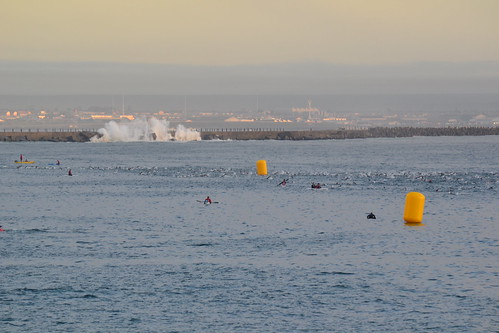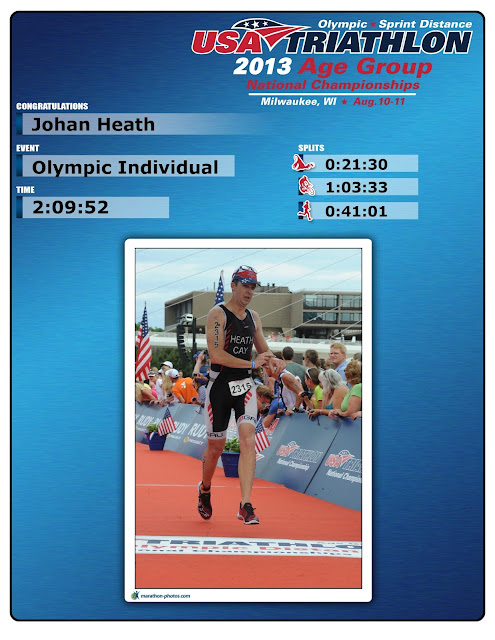ALL ABOUT THE BIKE
No matter which way you look at the Ironman South Africa
bike course, I truly believe what happens out on the bike course is the make or
break deal for one’s race. The bike effectively sets up the run. On average the
M35 – 39 spent 51% of race day on the bike (I calculated this % using the
results for M35-39).
Looking back over my training log during the last six months
it is the bike training where I missed most of my training sessions. No point
in making excuses here but I often got discouraged going out for a bike ride
due to traffic / road safety as well as the time it takes to get ready for a
bike ride. It always takes me at least 40min of faffing around to head out the
door and hit the road.
On average I only cycled twice a week. There were some weeks
where I only cycled once. Cycling once – twice a week to try and get fit for a
180km bike ride is simply not enough. Being the longest discipline of the day
one effectively needs to fit minimum 3 – 4 bike sessions in a week.
At this stage I would also like to thank my training partner
over the last couple of weeks namely Lyal. Lyal managed to get me out of bed
where on most of those mornings I would have just turned around and hit the
snooze button for good. Lyal did very well at his first attempt in the Ironman
distance finishing in a time of around 12:40.
Since moving back to South Africa and deciding to do Ironman
South Africa again it was the bike course that concerned me the most. I lived
in the Cayman Islands for six years and got accustomed to riding on flat and
fast roads with no real technical sections. Barring hurricane force winds there
were hardly ever winds blowing stronger than 40km/h whilst out cycling in the
Cayman Islands. On a very windy day in Port Elizabeth the wind can blow
consistently up to 70kmh whilst gusting even stronger than that. Hope and pray
that one never rides a disc in such conditions.
The first months getting back on my bike after a seven month
break from the sport was tough. Each time I went out for a longer ride I would
more often than not get excruciatingly sore quadriceps cramps on the inside
part of my quads. My understanding is that the quadriceps is made up of three
distinct parts. I always thought hamstring cramps were painful but quadriceps
cramps can leave one cringing with pain for a couple of minutes. I guess at
this point I am digressing here and enough of the pity party for the time
being.
Trying to make up for the lack of bike training over the
last six months I decided with my coach to do a solo ride of the 180km bike
course about a month before Ironman South Africa. The mental and physical effort
on that day was not pretty. It took me 6h and 6 minutes to do the course. I
took so many stops during that effort that from the time I started to the time
I got back home again 7.5 hours had passed. Mentally I just thought that there
is no way I will be breaking the 6h mark on race day. I felt exhausted after
that effort and tried to comprehend how I will still run a decent marathon
afterwards. I did not enjoy that day and mentally had second thoughts of doing
Ironman as a sport in the long term. I soon moved on from that and was thankful
that the solo effort provided me with much needed mental toughness on race day.
 |
| Passing by the Marine Hotel close to Hobie Beach |
So after reflecting on the above and coming back to race day
I headed out of T1 focused and ready to go. The first reality check after the
swim was when I tried to snap the elastic I fastened my shoe to my bike with to
save a couple of valuable seconds in T1. My goodness, I used a thicker elastic
band than usual. When the band snapped (after pulling it hard) it wacked
straight into my hand and gave me a good wake up coming out of transition.
For those of you familiar with the IMSA bike course, it
starts with a section of approximately 2km of flat road. One then heads up on a 10km section of road that has a gradual
incline all the way up to Builders Warehouse. From Builders Warehouse to
Lovemore Heights the road gets much steeper.
Interestingly enough, it was on the second lap at the top of
this hill where Frederik van Lierde eventually broke away from the rest of the
pack. Good place to launch such an attack. I believe that one of the crucial ingredients
that set Freddy van Lierde apart from the other pros on race day is that he
came out to Port Elizabeth for about two weeks in January to specifically come
and train and familiarize himself with all the intricacies of the course.
 |
| Cycling uphill from Maitland Mouth |
The first lap on the bike went really well I thought. I felt
good overall but also knew that I had to hold back as the second lap will get
tougher due to fatigue, easterly wind will pick up and I would also be riding
the second lap during lunch time which means the day was going to get hotter.
The only slight issue I had to deal with during the first
lap was my front hydration bottle. I used the “pump” water bottles to squeeze
water into my aero bottle. The cap on my aero bottle has a mid-section of plastic
that came undone whilst squeezing water to mix with my premade cytomax
concentrate. This resulted in most of my cytomax splashing out even whilst
cycling over the slightest of bumps in the road. To deal with this I luckily
had my rear bottle cage holder (X-lab) which I could make use of. At every aid
station I alternated between getting a bottle of GU electrolyte and/or a bottle
of “pump” water.
From reading various race reports written by pro triathletes,
age groupers and articles written by triathlon coaches there is common theme
that emerges. On race day one cannot keep thinking what I could have done
better or what I still have to do later on in the day. All that one can and
should do is to stay in the moment and focus on making the best decisions
during each moment on race day.
I thus decided to focus on my level of perceived exertion
during the bike and every now and then looked at my average heart rate. I was
surprised to see that I had completed the first lap of the bike course in a
time of 2h50min. Wow, I thought to myself “It is a full 13min faster than the
lap I did about a month earlier”. My first thought after seeing my lap 1 split
was “Darn, did I go too fast and as result I am going to suffer on lap 2 of the
bike course or what about my marathon effort”?
 |
| Cycling along Marine drive where the road surface is a bit rougher. |
I recall going up the
gradual 10km hill on the second lap (up to Lovemore Heights) and seeing very
few cyclists behind me or ahead of me. I found it very odd. I guess by that
stage cyclists were starting to get more spread out on the 90km route. That is
the good thing about having a 90km bike course lap versus the old 60km course
lap. Cyclists are spread out more over the course. It thus reduces the chance
of cyclists drafting.
This brings me to the next point. Like with most people
there are couple of things that ticks me off:
- · One of them being seeing people litter in general and especially flicking their cigarette butts out of their vehicles whilst driving. Even more so are people who throw their beer bottles in the streets resulting in shattered glass and eventually resulting in unnecessary punctures for cyclists. For those reading my race report and who have influence at Nelson Mandela Municipality, I truly believe something needs to be done about the “braai areas” that are situated on the opposite side of the Humewood golf course. Over Christmas time and New Year partygoers here did just what they wanted and broke so much glass from beer bottles that the shards of glass remained on that section of road for weeks. The area needs to be better enforced by policing services such as Humewood police. I saw Freddy van Lierde running on that section of road in January and felt embarrassed (being based in PE) that he had to see the amount of littering and raucous behaviour going on there.
- · Another type of situation that tends to work me up the wrong way is seeing groups of three to ten cyclists coming past in packs out on the bike course. These cyclists have conveniently decided “to work together” blatantly cheating trying to get a faster bike split and conserving energy for the run.
I must say kudos to the race marshalls for doing their best
on race day to keep the race fair. When I did see groups of cyclists the race
marshalls did give them warnings and issued those with the time penalties where
required.
Coming back from Maitland mouth (around the 130km mark) I
started feeling the fatigue and usual muscle and joint pains associated with
riding a bike for 5 – 6hours. Usually neck pain or lower back pain gives me the
most discomfort but on race day it was “dead spots” in my feet. I am in the
market for new bike shoes and can honestly do with some advice regarding
cycling shoes that has the best support in order to avoid dead spots as well as
pins and needles.
 |
| Ironman South Africa (Africa Champs) has such a scenic bike course |
When I saw the University on the final lap of the bike
course I got excited and knew that the end of the bike was in sight. I thought
to myself, the marathon is up next and just need to get off this bike. I remember
being worried at this point as I could not feel the front part of my left foot
as it had been so numb from the pedalling. A joint in my left foot was also
really sore which concerned me as it felt that it could even have a slight
dislocation.
Doing a rough calculation it appears that I was about 8min
slower on my second lap of the bike course. About half of that time loss was
due to fatigue and the other 4min I would ascribe to the easterly wind picking
up.
Herewith my bike
stats:
My bike split time – 5:47:43
Average speed – 31km/h
Men 35-39 age group bike placing: 31st / 237
Average bike split for the M35-39 age group: 6:46:13
Average bike split of M35 – 29 Kona qualifiers: 5:26:20
Onto T2 next. Was just so excited
to part my way with bike after close to a 6h journey. I must honestly that my
bike rode like a dream and would like to thank Kenneth from Triangle Sports for
doing such a great job servicing my bike on two occasions during the month
leading up to IMSA.


.jpg)

.jpg)
.jpg)
.JPG)
.jpg)

.JPG)
.JPG)
.JPG)


.JPG)
.JPG)

.jpg)






